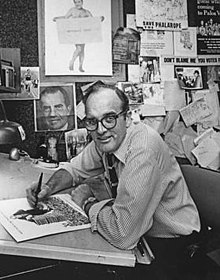Paul Conrad
| Paul Conrad | |
|---|---|

Paul Conrad sitting at his desk, circa 1973–1977
|
|
| Born |
Paul Francis Conrad June 27, 1924 Cedar Rapids, Iowa |
| Died | September 4, 2010 (aged 86) Rancho Palos Verdes, California |
| Other names | "Con" |
| Alma mater | University of Iowa |
| Occupation | Political cartoonist |
| Years active | 1950–2008 |
| Home town | Des Moines, Iowa |
| Spouse(s) | Barbara Kay King |
| Children | Jamie, David, Carol, Libby |
| Parent(s) | Robert and Florence Conrad |
| Relatives | Bob and James |
| Awards |
|
| Website | www |
Paul Francis Conrad (June 27, 1924 – September 4, 2010) was an American political cartoonist and winner of three Pulitzer Prizes for editorial cartooning. In the span of a career lasting five decades, Conrad provided a critical perspective on eleven presidential administrations in the United States. He is best known for his work as the chief editorial cartoonist for the Los Angeles Times during a time when the newspaper was in transition under the direction of publisher Otis Chandler, who recruited Conrad from the Denver Post.
At the conservative Times, Conrad brought a more liberal editorial perspective that readers both celebrated and criticized; he was also respected for his talent and his ability to speak truth to power. On a weekly basis, Conrad addressed the social justice issues of the day—poverty in America, movements for civil rights, the Vietnam War, the Israeli–Palestinian conflict, and corporate and political corruption were leading topics. His criticism of president Richard Nixon during the Watergate scandal landed Conrad on Nixon's Enemies List, which Conrad regarded as a badge of honor.
Conrad was born to Robert and Florence Conrad. He was raised in a conservative, Catholic family with his identical twin brother James and older brother Bob in Cedar Rapids, Iowa. He attended St. Augustin Elementary School in Des Moines, where he first began to show interest in art by writing on the bathroom wall. He was left-handed, but was forced by teachers to favor his right hand. Up until the age of 12, Conrad stuttered. At an early age, Conrad was exposed to the work of Jay Norwood Darling, more popularly known as "Ding Darling", whose conservative cartoons were featured in local newspapers and who became a "childhood role model" for Conrad.
After graduating Roosevelt High School, he and his brother spent time working construction jobs in Valdez, Alaska. Conrad also honed his talent as a musician while playing piano in a bordello. With World War II raging, Conrad and his brother enlisted. Because of his poor eyesight, Conrad was initially found to be unfit for military service, but he later served as a truck driver with the U.S. Army Corps of Engineers in the Pacific Theater of Operations at Guam and Okinawa, where he was given the nickname of "Con". He originally planned to attend Iowa State University after the war in 1945, but instead taught himself to play bass and joined a big band.
...
Wikipedia
